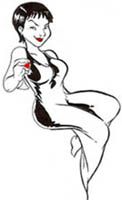Tuesday, January 18, 2005
vignette: The Latest Thing
This is what we do when the moon goes down.Those of us who know gather at the highest promontory in the area. Usually, this is some spot the teenagers call by something alarmingly alliterative: Lover’s Lane, Heartbreak Hill, like that. The name doesn’t matter—only the height, the silence, the solitude; the view, unobstructed as possible by buildings, gantries, satellite dishes.
By that time, most of the younger people will have gone from there, chasing curfews, placating parents, whisking through second-story windows. Or perhaps an early, early breakfast somewhere—feeling mature and cosmopolitan; eking out the night, heralding the light. Some few stragglers will remain, but be driven off eventually by the sheer metastasy of our presence.
We bring our own noise, of course. Someone will turn their car radio on to maximum. Or someone else will have brought an iPod or a laptop with speakers, blasting out the latest sound from some soon-discovered star. Rooted in the old, we are smitten with the new.
Marilla, predictably, will lead the dancing—on a car trunk or hood, or roof if one is available, which isn’t all too often. We prefer convertibles, sun roofs, motorcycles; part of the thrill, the unwritten rules. Others will join once she starts, further trampling the tire-marked grass, or just bobbing heads rhythmically from their places of repose.
Many of us will smoke. The new smokers, as I once was, will have all they can do to keep hands from shaking as they set sticks alight, the flame flaring far too close to fingers, lips, eyebrows. Most will be wreathed in smoke in moments, neglecting to inhale. The more experienced ones, showing off, prefer to use matches—igniting with the flick of a thumb, tossing the remains oh-so-carelessly into the brittle brush. They will lean back against windshields, windows, tires; exhaling the occasional smoke circle, building bridges of smoke from mouth to nose, establishing ephemeral cool.
Some few will actually entwine—lazily, luxuriously, desultorily. It’s become difficult to tell which is which, not that it truly matters.
What matters is the purple: the change, minute at first, as the day begins its inexorable climb from the shadows of evening. We all pretend not to be looking for it; yet we all rise—leisurely or abruptly, with anticipation or growing panic—as the sun begins its rising.
And slowly, yet startlingly sudden—the purple turns to pink; the pink turns to peach; the peach turns to gold. And when the first faint hints of turquoise begin to streak the sky, as one, we all turn and run for the vehicles.
The rules are: convertibles, if possible, tops down. Other cars with sun roofs opened. Windows rolled down, and none of those sun-shades. Motorcycles, of course, are exposed enough by their very construction. And we ride to beat the devil.
The devil’s devil, Santi used to say, before he went up that morning, two years ago, two minutes too slow; burst into flame like a candle, Harley wheeling crazily across the road, spitting out still more sparks as it smashed into something—a tree, a fence, who knows? We rode on, the wind in our hair, the blood in our veins, the burning at our backs.
And when we reached the still, cool, most importantly dark sanctuary, I, the newest of new blood at the time, was the only one not laughing, not exhilarated by the rush, the thrill, the daring of living on the knife-edge of dying.
“Don’t you care?” I lashed out at them, anguished, astonished, alarmed. “Don’t any of you bastards give a damn!? He just died! Santi’s dead!”
“Darling,” Marilla said that night, eyeing me coolly as she lit up a new coffin nail, “aren’t we all?”










